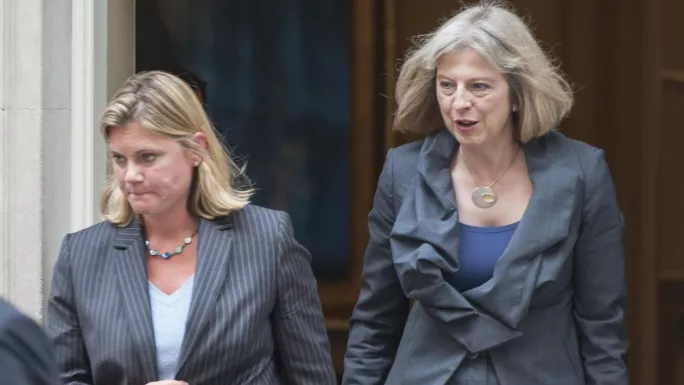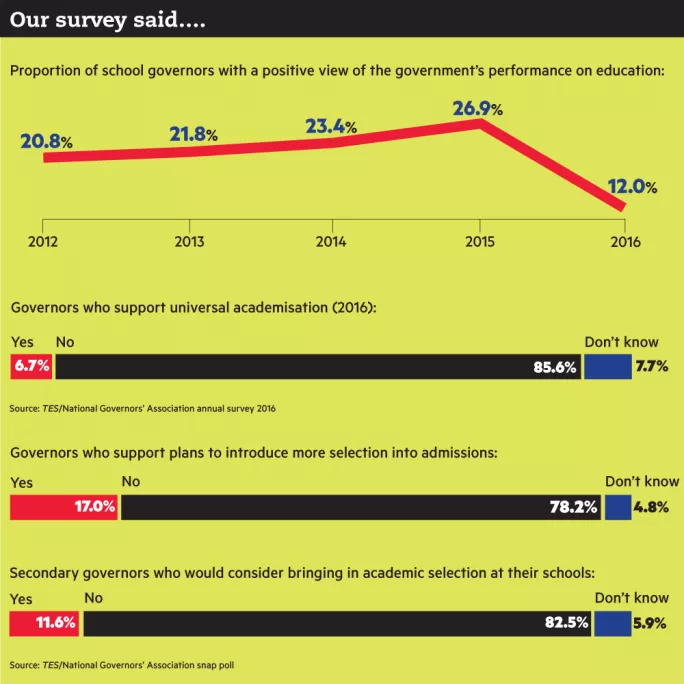Governors have no faith in ‘negative’ Tory policies

School governors have issued the Conservative government with a major vote of no confidence after its first full year in power, according to a landmark survey.
More than three-quarters of governors have given the government’s performance a “negative” rating. And just over half see the Tories’ first year in power as “very negative”, the joint TES and National Governors’ Association (NGA) research shows.
Less than 7 per cent of school governors support ministers’ ultimate goal of universal academisation, while 85.6 per cent oppose it, according to the survey, which gathered more than 5,000 responses.
And a supplementary snap poll by NGA for TES this week reveals that governors are overwhelmingly opposed to prime minister Theresa May’s plans for a new wave of grammar schools.
Emma Knights, NGA chief executive, said governors were increasingly concerned that ministers’ main focus was on school structures rather than other issues that her members viewed as more pressing.
Funding a ‘huge concern’
“There’s a feeling that school funding, leadership recruitment and, increasingly, teacher recruitment have not been high enough up the government’s agenda,” Ms Knights said. “There’s a sense that there has not been enough focus on the serious issues governors are grappling with. Funding is a huge concern for governors. It is top of their list of worries.
“No governor wants to sit on a board that is looking at teacher redundancies and staff restructuring, but that is what they are facing in the coming years.”
Ms Knights said that there were also major concerns among primary school governors about changes to assessment.
The research reveals that:
*Squeezed budgets mean many schools have been forced to shed staff, with further reductions to staff spending expected over the next two years.
*Teacher shortages seem to be getting worse.
*Schools that opt for academy status are not embracing the freedoms it brings in terms of curriculum, and teachers’ pay and conditions.
*Secondary governors are using 11-16 funding to subsidise their sixth forms as cuts in post-16 budgets bite.
Most damningly, just 12 per cent of school governors have a positive view of the government’s performance in education, the survey finds. Overall, 77.8 per cent of respondents have a negative view, with 52.5 per cent offering a “very negative” verdict - a 21.7 percentage point increase from last year.

The survey reveals that cuts to school funding have already forced 40.6 per cent of governors to reduce teacher numbers.
Almost a third (29.4 per cent), said they had been forced to cut the number of subjects their school offered to pupils.
The outlook for the next two years is equally bleak, with 59.5 per cent saying that they will be forced to cut staff spending - compared with less than half (47.5 per cent) last year. To compound problems, governors have signalled that the teacher supply crisis is getting worse, with half (49.7 per cent) stating that they are finding it hard to recruit “good candidates” when filling vacancies. This is up from 32 per cent in 2014.
One vice-chair of governors at a community school warned that shortages had left teachers with “very low morale”, adding: “In the four years I have been a governor, it has become harder and harder to recruit teachers. Many are very disillusioned.”

A supplementary TES and NGA poll of nearly a thousand school governors finds that eight in 10 are opposed to government plans to introduce more selective education.
Malcolm Trobe, interim general secretary of the Association of School and College Leaders, said: “It’s not surprising that there is a negative response, but what is surprising is the scale of it.
“It could be because it’s impacting on all sectors. There isn’t any part of the school sector that has not had a huge amount of change.”
The Department for Education was contacted for comment.
You need a Tes subscription to read this article
Subscribe now to read this article and get other subscriber-only content:
- Unlimited access to all Tes magazine content
- Exclusive subscriber-only stories
- Award-winning email newsletters
Already a subscriber? Log in
You need a subscription to read this article
Subscribe now to read this article and get other subscriber-only content, including:
- Unlimited access to all Tes magazine content
- Exclusive subscriber-only stories
- Award-winning email newsletters